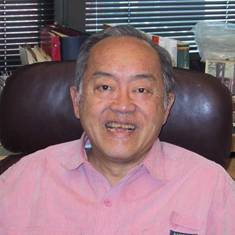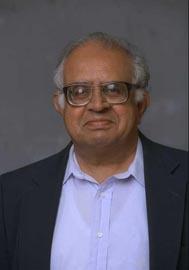Samhita literally means "put together, joined, union", a "collection", and "a methodically, rule-based combination of text or verses". Saṃhitā also refers to the most ancient layer of text in the Vedas, consisting of mantras, hymns, prayers, litanies and benedictions.

The Vedas are a large body of religious texts originating in ancient India. Composed in Vedic Sanskrit, the texts constitute the oldest layer of Sanskrit literature and the oldest scriptures of Hinduism.

Sankar Kumar Pal is a computer scientist and the president of the Indian Statistical Institute (ISI), Kolkata. He is also a National Science Chair, Government of India. Pal is a computer scientist with an international reputation on pattern recognition, image processing, fuzzy neural network, rough fuzzy hybridization, soft computing, granular mining, and machine intelligence. He pioneered the development of fuzzy set theory, and neuro-fuzzy and rough-fuzzy computing for uncertainty modelling with demonstration in pattern recognition, image processing, machine learning, knowledge-based systems and data mining. Pal is widely recognized across the world for his pioneering and extraordinary contributions in Machine Intelligence, Fuzzy Logic, Soft Computing and Pattern Recognition. This has made India a leader in these disciplines in international scenario. He founded the Machine Intelligence Unit in 1993, and the Center for Soft Computing Research: A National Facility in 2004, both at the ISI. In the process he has created many renowned scientists out of his doctoral students.
Mac Elwyn Van Valkenburg was an American electrical engineer and university professor. He wrote seven textbooks and numerous scientific publications.

King-Sun Fu was a Chinese-born American computer scientist. He was a Goss Distinguished Professor at Purdue University School of Electrical and Computer Engineering in West Lafayette, Indiana. He was instrumental in the founding of International Association for Pattern Recognition (IAPR), served as its first president, and is widely recognized for his extensive and pioneering contributions to the field of pattern recognition and machine intelligence. In honor of the memory of Professor King-Sun Fu, IAPR gives the biennial King-Sun Fu Prize to a living person in the recognition of an outstanding technical contribution to the field of pattern recognition. The first King-Sun Fu Prize was presented in 1988, to Azriel Rosenfeld.

Linda G. Shapiro is a professor in the Department of Computer Science and Engineering, a professor of electrical engineering, and adjunct professor of Biomedical Informatics and Medical Education at the University of Washington.
The Taittirīya Shakha, is a shakha of the Krishna (black) Yajurveda. Most prevalent in South India, it consists of the Taittirīya Samhita ('TS'), Taittirīya Brahmana ('TB'), Taittirīya Aranyaka ('TA'), and Taittirīya Pratisakhya ('TP').

Anurag Kumar was the Director of the Indian Institute of Science at Bangalore, India from 2014–2020. He is a professor at the Department of Electrical Communication Engineering, and has served as the Chairperson of the Electrical Sciences Division at the Indian Institute of Science, before being appointed as the Director in 2014.

Vidyalankara Saligrama Krishna Ramachandra Rao was an Indian author, Sanskrit scholar and professor of psychology.

Yu-Chi "Larry" Ho is a Chinese-American mathematician, control theorist, and a professor at the School of Engineering and Applied Sciences, Harvard University.

Rangachar Narayana Iyengar, also known as RNI, is a civil engineer and professor from India. He was with the Indian Institute of Science, Bangalore for about four decades. He has been the director of Central Building Research Institute, Roorkee (1994–2000). He is currently a Raja Ramanna Fellow, and the Director for the Center for Ancient History and Culture (CAHC) at the Jain University, Bangalore. He also setup the Center for Disaster Mitigation (CDM) at the Jain University. He has in the past been the editor of 'SADHANA' published by the Indian Academy of Sciences, Bangalore. Apart from his contributions to Engineering, he is also widely recognized for his work in History of Science.

Jitendra Malik is an Indian-American academic who is the Arthur J. Chick Professor of Electrical Engineering and Computer Sciences at the University of California, Berkeley. He is known for his research in computer vision.

Durga Mohan Bhattacharyya was an Indian scholar of Sanskrit. He had served as a professor of Sanskrit at the Scottish Church College in Calcutta.

Theodosios Pavlidis is a computer scientist and Distinguished Professor Emeritus of Computer Science at the State University of New York, Stony Brook.

Vaidyeswaran Rajaraman is an Indian engineer, academic and writer, known for his pioneering efforts in the field of Computer Science Education in India. He is credited with the establishment of the first academic program in computer science in India, which he helped initiate at the Indian Institute of Technology, Kanpur in 1965. An elected fellow of all the Indian science academies, he is a recipient of Shanti Swarup Bhatnagar Prize, the highest Indian award in Science and Technology category for young scientists and several other honors including Om Prakash Bhasin Award and Homi Bhabha Prize. The Government of India awarded him the third highest civilian honor of the Padma Bhushan, in 1998, for his contributions to science.
Kalappa Muniyappa is an Indian molecular biologist and geneticist, known for his researches on the chromatization of DNA and gene targeting. He is a professor and chairman of the department of biochemistry of the Indian Institute of Science and an elected fellow of the Indian National Science Academy, Indian Academy of Sciences and the National Academy of Sciences, India. The Council of Scientific and Industrial Research, the apex agency of the Government of India for scientific research, awarded him the Shanti Swarup Bhatnagar Prize for Science and Technology, one of the highest Indian science awards, in 1995, for his contributions to biological sciences.
Yendluri Shanthi Pavan is an Indian electrical engineer and a professor at the Department of Electrical Engineering of the Indian Institute of Technology, Madras. He is known for his studies on mixed signal VLSI circuits and is an elected fellow of the Indian National Academy of Engineering. He is also a fellow of IEEE. The Council of Scientific and Industrial Research, the apex agency of the Government of India for scientific research, awarded him the Shanti Swarup Bhatnagar Prize for Science and Technology, one of the highest Indian science awards for his contributions to Engineering Sciences in 2012.
Ramalingam "Rama" Chellappa is a Bloomberg Distinguished Professor, who works at Johns Hopkins University. At Johns Hopkins University, he is a member of the Center for Language and Speech Processing, the Center for Imaging Science, the Institute for Assured Autonomy, and the Mathematical Institute for Data Sciences. He joined Johns Hopkins University after 29 years at The University of Maryland. Before that, he was an assistant, associate professor, and later, director, of the University of Southern California's Signal and Image Processing institute.
Khaled B. Letaief is a Tunisian academic who is the New Bright Professor of Engineering and Chair Professor at the Department of Electronic and Computer Engineering of the Hong Kong University of Science and Technology (HKUST), Hong Kong. His research lies in the general area of wireless communications and networks, with research interests in AI and machine learning, mobile cloud and edge computing, tactile internet, and 6G systems. He is a fellow of the Institute of Electrical and Electronics Engineers (IEEE) since 2003, and an international member of the United States National Academy of Engineering (NAE) since 2021.
Birsen Yazıcı is a Turkish-American electrical engineer whose research interests include imaging radar, the use of optical tomography in biomedical applications, and the remote diagnosis of faults in electromechanical machinery. She is a professor at the Rensselaer Polytechnic Institute, in the Department of Electrical, Computer & Systems Engineering and the Department of Biomedical Engineering.












